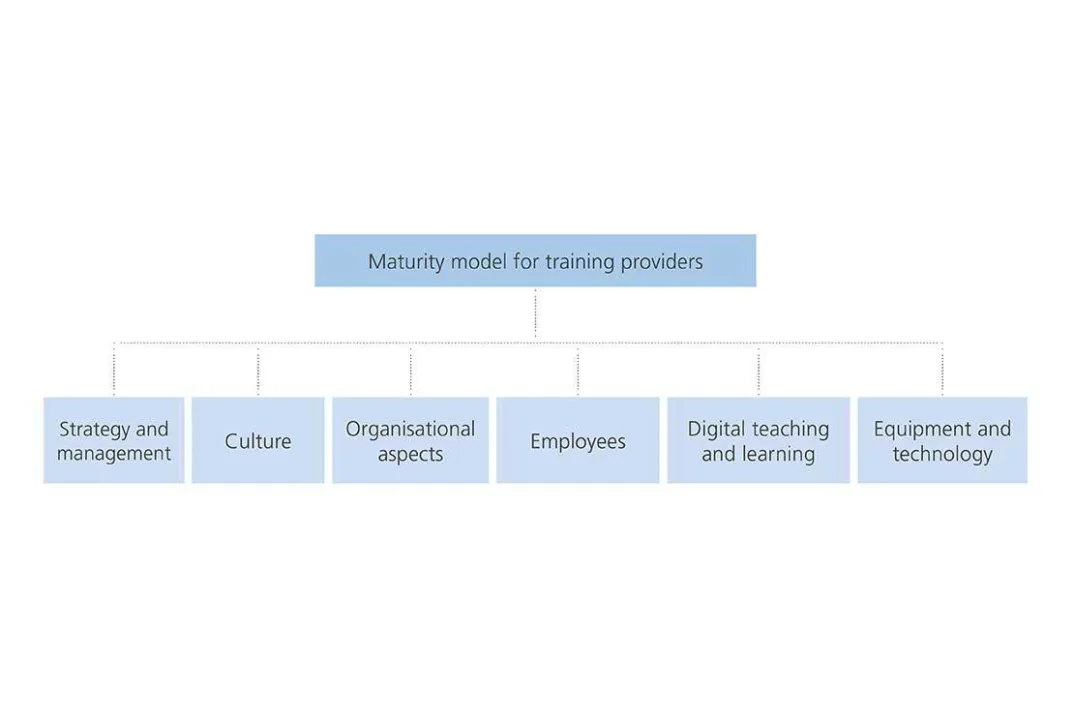A versatile instrument for the creation, review and revision of training programmes
Under the Vocational and Professional Education and Training Act, up to 10% of federal funding allocated to the Swiss VPET system is used for the creation, review and revision of training programmes and to support special activities that serve the public interest. With sustainable development becoming a new funding priority in October 2023, the Confederation intends to allocate greater resources for project funding.

Targeted project from the federal governmentfunding
The revised Vocational and Professional Education and Training Act (VPETA) came into force in 2004, bringing about a change in the funding system. The Confederation will now allocate most of its funds for the Swiss VPET system to the cantons in the form of lump-sum subsidies calculated on the basis of performance. This will give the cantons greater autonomy, allowing them to use these funds as needed in a regionally differentiated manner. At national level, direct support is provided, among other things, through the use of subsidies for innovation projects (pilot trials, start-up funding for the creation of self-supporting structures) and for special tasks in the public interest (e.g. measures to foster equality between men and women).
Project funding enables the Confederation to provide targeted support to the cantons, professional organisations and other partners in their projects. This will create momentum and encourage progress. Project funding is a tried and tested instrument for the continuous renewal of training programmes. It is also used to support special activities that serve the public interest. The use of funds is governed by Articles 54 and 55 VPETA. In 2022, the Confederation provided a total of around CHF 38.5 million in funding for projects pursued by the cantons, professional organisations and other partners.
Project funding for the creation, review and revision of training programmes and for measures to improve quality
Projects within the meaning of Article 54 VPETA enable forward-looking structures to be created and adapted within the Swiss VPET system. Projects are supported for a maximum period of four years (start-up funding). Project initiators are expected to contribute at least 40% of their own resources. Examples include:
- Pilot projects and studies
- Measures to create support structures for new training programmes
- Measures aimed at improving quality
Project funding for activities that serve the public interest
Projects within the meaning of Article 55 VPETA are activities that serve the public interest but cannot be carried out without additional funding. Projects are supported for a maximum period of five years. However, this period can be extended if necessity can be demonstrated. Here, too, project initiators are expected to contribute at least 40% of their own resources. Examples include:
- Measures to promote true gender equality
- Measures to help persons with disabilities to gain access to initial and continuing education and training
- Creation of teaching materials intended for linguistic minorities
- Measures to improve understanding and exchange between linguistic communities
- Measures to help young people confronted with academic, language or social barriers to gain greater access to VET programmes
- Measures to help people to remain economically active or find new employment
- Measures to promote other qualification procedures
- Measures designed to maintain and expand the number of available apprenticeship positions
Further development of funding practices
This legal basis serves as the frame of reference for project funding. However, legislation has been crafted in such a way as to give the Confederation the freedom to tailor its funding practices to suit the needs of partners and in response to recent developments. For example, SERI has repeatedly channelled funding to specific priority areas. The most recent example is ‘Sustainable development in initial and continuing education and training’, a funding priority launched in October 2023. In addition, project funding is a key policy instrument that has sustained the work of VPET partners over time. For example, since the Vocational and Professional Education and Training Act came into force in 2004, the Confederation has provided lump-sum contributions for the development of new occupations and the review and revision of training programmes for existing ones. Starting on 1 January 2024, SERI will increase its contributions to training providers as follows.
Increase in lump-sum subsidy for the creation, review and revision of VET programmes
The creation, review and revision of training programmes falls under the responsibility of professional organisations. They know best which skills are needed on the labour market and understand the future direction that a given occupation should take. As an advisory body to cantonal authorities, it is responsible for maintaining and improving quality, for optimising and updating documentation and adapting occupational profiles over time.
The process of creating, reviewing and revising training programmes was jointly analysed as part of the project to optimise processes and incentives in vocational education and training. This analysis included funding aspects and several optimisation proposals were made. In most cases, funding takes place in the form of lump-sum subsidies. The aim was therefore to optimise the funding system. The result is a significant increase in lump-sum subsidies to the organisations responsible for VET programmes to cover the costs of creating, reviewing and revising these programmes and in the development of other qualification procedures. The increase in federal subsidies takes into account the complexity of this process as well as the increasing coordination and translation costs. The new funding system also more adequately reflects the uniqueness and structure of each occupation.
Specifically, this means that in addition to a basic lump-sum amount paid per VET ordinance and training plan, an additional contribution will now be paid per occupation in each occupational field as well as per specialism or focus. The amount of funding paid for the development of other qualification procedures will also be increased. The lump-sum contributions for the first-time use of the standard template and for 'accompanying occupational health and safety measures' will no longer be paid separately but rather will now be financed through the increase in the basic lump-sum amount. Although the adjusted subsidies will come into effect from 1 January 2024, professional organisations that are currently in the process of applying for funding can already request the new lump-sum contributions.
Funding priority: 'Sustainable development in initial and continuing education and training'
With sustainability becoming an increasingly important issue, public awareness of the economic, social and environmental impacts of business activities is growing. For its part, the business community itself is also showing greater willingness to take responsibility in this area. VPET partners and other stakeholders play a pivotal role in this. In order to make them more aware of the possibilities available to them, SERI has created the funding priority 'Sustainable development in initial and continuing education and training'. This funding priority is based on a holistic approach that includes the following:
- Consulting
- Financial support
- Training materials
- Transfer of knowledge and experience
Consulting
Consulting is crucial in ensuring a constructive approach to the three aspects of sustainable development (economic, social and environmental), whose scope and interactions are not always easy to grasp. SERI therefore offers guidance and support to professional organisations to help them include sustainable development concepts in the process of creating, reviewing and revising training programmes. Examples include the 'Guidebook on Sustainable Development in Vocational and Professional Education and Training". This support allows professional organisations to set forward-looking objectives, address aspects of sustainability and encourage responsible action by providing skilled workers with the corresponding knowledge and know-how.
Financial support
Funding is provided for projects and initiatives of VPET partners and other interested parties. SERI offers funding, for example, for the following activities: for analysis and consulting to facilitate the inclusion of sustainable development in the creation, review and revision of training programmes; for projects focussing on sustainable development in initial and continuing education and training; and for organisations involved in the provision of continuing education.
Training materials
SERI also ensures that sustainable development is taken into account in the development of various core syllabuses. This ensures that this topic is covered in the training of target groups in a way that matches their level and background.
Transfer of knowledge and experience
Sustainable development is a participatory process and comes about through the needs and initiative of individual actors. This also applies to initial and continuing education. Sustainable development requires solid expertise in order to fully grasp the various issues, to perceive correlations with professional life, and to take action where possible. SERI encourages the transfer of knowledge and experience by organising its own events or contributing to initiatives taken by its partners.
Example of project: ‘Digital transformation in vocational education and training’
Digitalisation is rapidly transforming the economy and working life and poses a challenge for the education sector. Digitalisation is also changing the role of school management. The main objective of the SERI-supported project 'Digital transformation in vocational education and training and the role of school management' was therefore to provide vocational school managers with scientifically sound action plans that have been tried and tested in practice as well as to facilitate their implementation. The Institute of Entrepreneurship & Management at the University of Applied Sciences of Western Switzerland (HES-SO) acted as the organising body. It was supported by the Round Table of Vocational Schools, the Swiss Conference of Directors of Vocational Schools and the University of Constance. The project ran from mid-2018 to September 2023.
School management is challenged more than ever to keep up with the rapid pace of change. In their role, school managers must not only shape the general conditions for this, but must also contribute to the success of change through their leadership behaviour. Empirical data should be consulted in order to ensure success. Working with the University of Constance, the pace of the digital transformation in vocational schools was systematically assessed throughout Switzerland for the first time. A good 580 school managers from around 170 schools took part in the survey. The final report presents a total of over 30 possible courses of action and presents a series of recommendations for implementation based on the 'maturity model for training providers’:

Typical indicators for the Strategy and management portion include the existence and implementation of a digital strategy, the level of priority given to the digital transformation, leadership behaviour and the constant evaluation of new technologies. In terms of Culture, the focus is on the level of openness to new technologies, readiness for change, candid communication and mutual support. Organisational aspects include adequate financial resources, technical support, centralised purchasing and maintenance, pedagogical support or the general establishment of rules and standards. The Employees portion assesses skills in the use of digital technologies as well as devices and services, personal attitudes or the willingness to undergo further training. The Digital teaching and learning portion includes, for example, implementation of the guiding principle 'technology follows teaching’ and support for a healthy, digitally supported feedback culture. Finally, indicators for the Equipment and technology portion include modern infrastructure or the availability of digital devices and software.
Contact
Author



